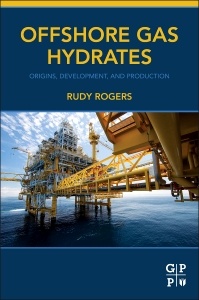Offshore Gas Hydrates Origins, Development, and Production
Auteur : Rogers Rudy

Gas hydrates collect and store both thermogenic and biogenic methane generated in deep ocean sediments that, over geologic time, forms vast methane repositories. Offshore Gas Hydrates: Origins, Development, and Production presents gas hydrates as an emerging, clean energy source possibly more abundant than all other fossil fuels and especially important for countries geographically and economically restricted from conventional fossil fuel resources. The book explores feasible methods to produce offshore hydrate gas, the means to store and transport the remotely produced gas, new hydrate inhibitors for conventional and hydrate production in ultra-deep waters, instability manifestations of seafloor hydrates, and hydrate roles in complex ecological scenarios. Complementing production and drilling method presentations are computer simulation studies, hydrate field tests, and seismic and logging developments. Offshore Gas Hydrates delivers a well-developed framework for both the oil and gas researcher and corporate engineer to better exploit this future unconventional resource, empowering the oil and gas professional with the latest data and information on sophisticated challenges that offshore hydrates present.
Chaper 1: IntroductionChapter 2: Deep Ocean Sediment-Hydrate RelationshipsChapter 3: Gulf of Mexico, Thermo-Biogenic HydratesChapter 4: Producing Methane from Offshore HydratesChapter 5: Hydrate Inhibition during Drilling & ProductionChapter 6: Hydrate-Associated Seafloor InstabilitiesChapter 7: Biogenic Hydrate ProvincesChapter 8: Microbe, Mineral Synergy and Seafloor Hydrate NucleationChapter 9: Hydrate Zone EcologyChapter 10: Martian Hydrate Feasibility; Extending Extreme Seafloor Environments
- Addresses the technical, economic, and environmental problems of producing hydrate gas.
- Introduces the overlooked and unchartered role of microbes in catalyzing offshore hydrate formations with attendant effects on stability/dissociation.
- Reviews the latest world-wide field tests, research, and case studies involving seafloor hydrates, inclusive of most known hydrate provinces.
- Displays two videos within the e-book only: (1) hydrates, carbonates, chemosynthetic communities, and natural hydrocarbon leakages on the seafloor at the Mississippi Canyon hydrate observatory site; (2) hydrate nucleation, migration and self-packing in a laboratory test cell under the influence of anionic surfactants.
- Extends deep-water hydrate knowledge regarding the hydrate formation and protective cover for microbes within the extreme environment of Mars.
Date de parution : 08-2015
Ouvrage de 398 p.
15x22.8 cm
Thèmes d’Offshore Gas Hydrates :
Mots-clés :
seafloor; gas hydrates; natural gas; fossil fuel; clean burning; microbial; gulf of mexico; arctic; macondo; hydrate inhibitors; depressurization; Prudhoe Bay; Alaska North Slope; permeability; gas plumes; lake nyos; hydrate formation; hydrate mitigation; gas chimneys; salt tectonic; fauliting; green canyon; alaminos canyon; perdidio fold belt; Nankai trough; offshore; subsea; biogenic; gas venting; sediment; gas flares; microbe; smectite



